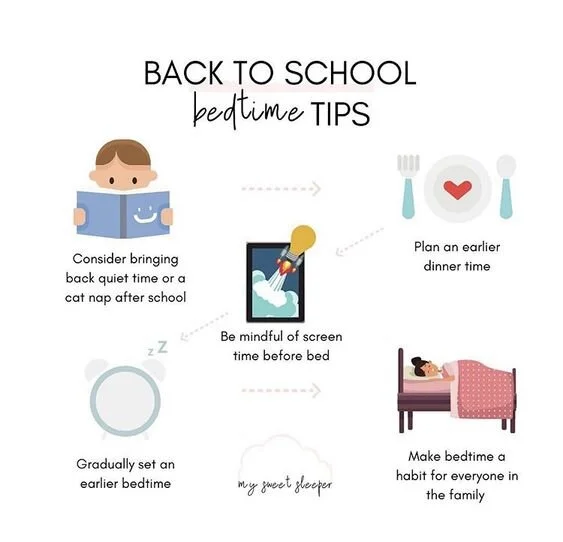Five easy tips to help your child adjust back to school and to a regular sleep schedule
It’s back to school season, which means right back to schedules and routines, and a little less freedom and flexibility. While many of us feel ready to bring some structure back into our days, this transition back to school can be rough for the whole family, especially when it comes to sleep. During the summer months, bedtime inevitably becomes a bit more lenient and sleeping in can become the norm when you don’t have anywhere to be.
So, whether your kids are about to start school, or already have, here are a few tips we recommend considering as you all adjust to the new season.
1. Jump back into an appropriate bedtime.
If you have time to gradually transition to an earlier bedtime, then great. But if not, don’t worry, you can start now! We generally recommend a bedtime between 7:30pm-8:30pm for school-aged kids so they can get a minimum of 9-11 hours of sleep each night.
2. Encourage exercise after school.
School can be both mentally and physically exhausting for children, but making sure they keep their activity level up is a great way to ensure a good night’s sleep. If your child has an interest in sports or after-school activities, we encourage this if it is doable with your other commitments.
3. Plan an earlier dinner time.
I don’t know about you, but during the summer, it seems our “set” dinner time goes out the window. Sometimes we eat at 5pm, and sometimes it ends up being 7:30pm before we make it to the dinner table. An earlier dinner time helps with digestion and generally can prevent sleep disturbances for children. Eating earlier also ensures you have plenty of time to start the bedtime routine and have your kiddos in bed by their set bedtime.
4. Limit screen time and over-stimulating activities before bed.
While many children use tablets and other electronics for homework, it is important to be mindful of how much screen time they are exposed to before bed. The light from screens suppresses melatonin almost immediately and will affect your child’s ability to transition to sleep. It is best to encourage calming activities before bed and cut all exposure to screens at least two hours before bedtime.
5. Be consistent, even on weekends.
Children need our help staying consistent because, let’s face it, if it were up to them, they would stay up until well past an appropriate bedtime. Even on the weekends, I encourage consistency in bedtime and bedtime routines to help their internal clock and circadian rhythm stay on track.
While this season can feel busy and chaotic at times, remember that children are resilient and often adjust more easily than we think. By following the above steps, you are not only helping your child transition to healthier sleep habits, but you are also allowing your entire family to get the rest you all need!
Related:
Five ways to overcome the bedtime battle
This is how early your child should be going to bed
Here’s why consistent bedtimes are more important than you think

